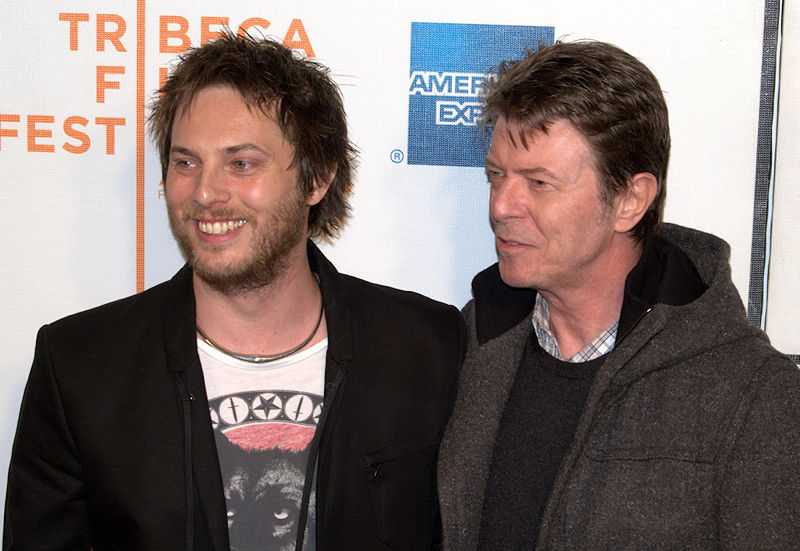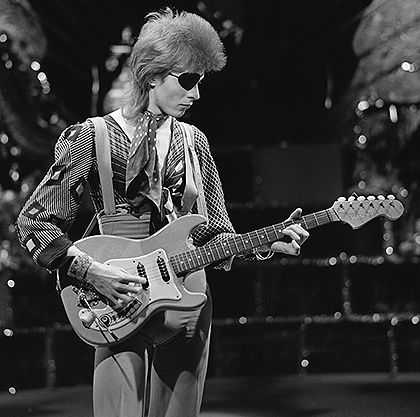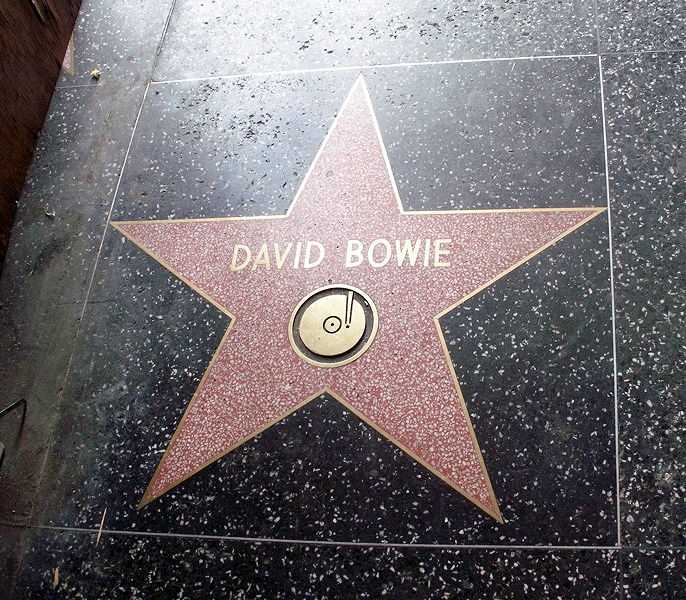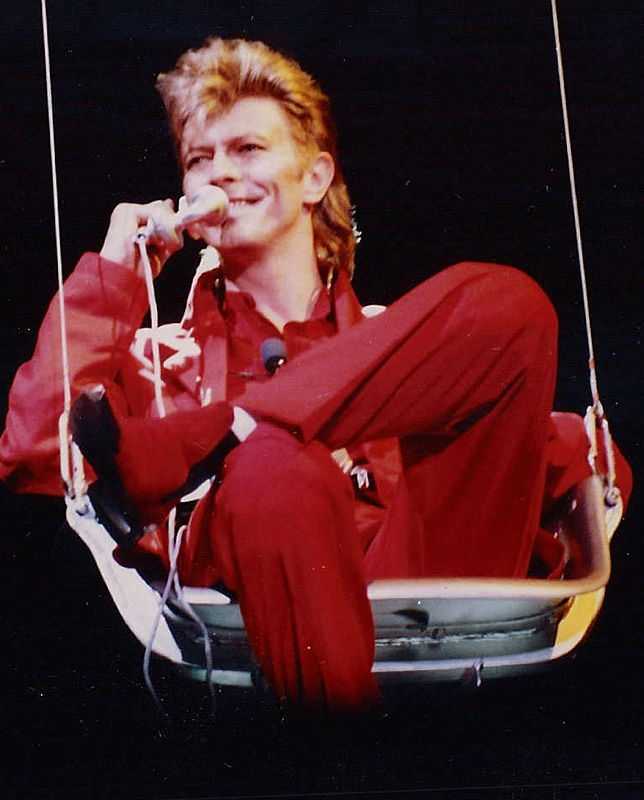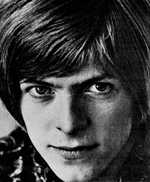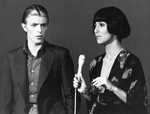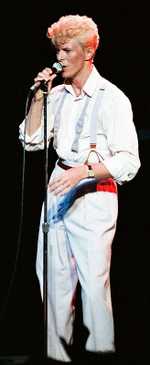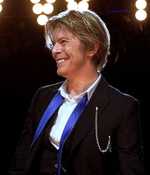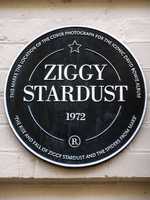1. Bowie's early life
David Bowie was born David Robert Jones in South London's Brixton on 8 January 1947 to mother Margaret 'Peggy', a waitress, and charity worker father, Haywood 'John' Jones. The family moved to the suburbs of Bromley in 1953.
Bowie developed an interest in music as a child. When he was 9-years-old, Bowie’s father brought home a collection of American 45s by artists including Fats Domino, Elvis Presley, and Little Richard. Upon listening to Little Richard's song "Tutti Frutti", Bowie would later say that he had "heard God".
He was also heavily influenced by his half-brother’s musical tastes. Terry Burns, nine years David’s senior, introduced him to beat literature and jazz music in particular. Bowie learned to play the saxophone aged 13.
Contrary to reports, Bowie was not born with eyes of two different colours. In fact, the blue-eyed charmer got into a fight with his friend, George Underwood, over a girl when he was 15. Underwood through a hit at Bowie, which left him with a permanently dilated pupil and trademark mismatched eyes.
There were no hard feelings as the two later collaborated on an album and Underwood also went on to design the album covers for some of Bowie’s most famous records, including The Rise and Fall of Ziggy Stardust and the Spiders from Mars.
Bowie left Bromley Technical High School a year later and went on to work as a commercial artist. Determined to make his name as a musician, he also formed a number of bands and led a group calling himself Davy Jones, releasing You’ve Got A Habit Of Leaving with the band in 1965.
Soon after, the musician changed his name to Bowie to avoid confusion with Davy Jones from US pop group, The Monkees. The name was said to be inspired by a knife developed by the 19th century American pioneer Jim Bowie.
Following his name change, Bowie decided to set out on his own as a solo artist, releasing three singles for Pye Records and his debut album, The World Of David Bowie. The records did not achieve the huge success he would go on to experience and he retreated to a Buddhist monastery in Scotland in 1967.
After returning to London he started mime arts troupe Feathers in 1968. In 1969, Bowie met the 19-year-old Angela Barnett, an American introduced to him by a mutual friend. They went on to marry the following year, having a son – Zowie, a film director now known as Duncan Jones – in 1971. Their turbulent marriage ended in divorce in 1980.
In the summer of 1969, Bowie released the single Space Oddity on Mercury Records, his first UK number one. The song, inspired by Stanley Kubrick’s film 2001: A Space Odyssey was used by the BBC during its coverage of the Apollo 11 moon landing. On a re-release in 1972 it went to number 15 in the US charts.
2. The International Success
No stranger to shifting and taking on different forms, Bowie, with his theatrical poise and acting talents, created the “glam rock” persona Ziggy Stardust, which won him international acclaim. While Bowie had many alter egos over the years, Ziggy Stardust is the one he was most famous for.
But the character was to be short lived as in 1973, with five albums in the British top 40, Bowie announced at a concert that Ziggy Stardust would be retiring. He later admitted that Ziggy:
“wouldn't leave me alone for years. That was when it all started to go sour ... My whole personality was affected. It became very dangerous. I really did have doubts about my sanity."
By the mid 1970s Bowie had undergone a full-scale makeover, and he traded in the outrageous costumes and garish sets for a sleeker more tailored look - the dapper style he would became synonymous with. In two short years he released the albums David Live (1974) and Young Americans (1975).
The latter album featured backing vocals by a young Luther Vandross and included the song Fame, co-written with John Lennon and Carlos Alomar, which became Bowie’s first American number one single.
In 1976, David made his film debut, starring in The Man Who Fell to Earth, a Nic Roeg film about an alien who crashes to earth while seeking water for his planet.
Never the one to follow conventions, Bowie went on to frustrate his record company – who wanted to capitalise on his huge US success – by moving to West Berlin, renting a flat with Iggy Pop and releasing a series of less accessible albums. Low (1977), Heroes (also 1977) and Lodger (1979) were all recorded in collaboration with former Roxy Music keyboard player, Brian Eno. David had by now developed a serious cocaine habit and its bleakness was mirrored in those three releases, which became known as the Berlin Trilogy.
It was believed that Bowie was living on a diet of peppers, milk and cocaine at the time. Ever the tower of strength, courage, and will, he dropped the drug persona just as easily as he had done with the Ziggy Stardust persona earlier. He told a friend:
“I’ve got over all my cocaine stuff now. I took that image off. I put it in a wardrobe in a LA hotel room and locked the door.”
During the 1980s, Bowie’s life became less hedonistic and his musical period became even more experimental. In 1983, he released the chart-topping album Let’s Dance. Produced by Nile Rogers, the album featured several hits including the title track, Modern Love and China Girl. Bowie toured the album extensively, experiencing success on a huge scale.
The decade also produced a personal tragedy for Bowie when, in January 1985, his beloved brother Terry, who had been battling manic depression and schizophrenia, committed suicide. The episode prompted Bowie to withdraw from the spotlight for some time.
Bowie returned in 1986 to one of his other loves acting, when he starred as Jareth, the Goblin King, in the fantasy-adventure film Labyrinth, directed by Jim Henson and produced by George Lucas. Bowie performed opposite teenage Jennifer Connolly and a cast of puppets in the movie, which became a 1980s cult classic.
Over the next decade, Bowie bounced back and forth between acting and music. Although his music, following Let’s Dance, produced few hits - it neither bothered him as Bowie was truly about making music for the love of it and as avenue to channel his own artistic practices, rather than producing ratings winners. His rock albums with new band – Tin Machine (1989) and Tin Machine II (1991) – were not well-received.
3. His later years
Bowie’s hotly-anticipated album Black Tie White Noise, released in 1993, and described as a wedding present for his new wife and love of his life, Somali-American supermodel Iman, was released with very little promotion by the record label. It reunited him with Nile Rogers fusing soul, jazz and hip hop influences.
David was inducted into the Rock and Roll Hall of Fame in 1996. And for the remainder of the 1990s, Bowie continued to experiment with electronic music and ever the innovator, incorporated British jungle and drum’n’bass on his 1997 album release, Earthling.
Bowie and Iman, living in New York, welcomed their daughter Alexandria Zahra Jones in 2000. Three years later, Bowie famously refused a knighthood, saying:
“I would never have any intention of accepting anything like that. I seriously don’t know what it’s for. It’s not what I spent my life working for.”
In 2004, Bowie had an emergency heart operation after he developed a blocked artery. He recovered well and pretty much retired from public life, having only brief flirtations with other artistes’ work. He worked with bands such as Arcade Fire, and with the actress Scarlett Johansson in 2008 on her album Anywhere I Lay My Head, a collection of Tom Waits covers.
Bowie also received the Grammy Lifetime Achievement Award in 2006. The same year also saw his last live appearance, where he performed with Alicia Keys at a New York charity event. He also returned to acting.
He played Tesla in The Prestige (2006) and had a small cameo in the comedy Extras: David Bowie (2006) for fan Ricky Gervais. In 2007, he did a cartoon voice in SpongeBob SquarePants (1999) playing Lord Royal Highness.
In 2013, Bowie returned from a decade-long recording hiatus with The Next Day. He remained musically active until he died of liver cancer two days after the release of his final album, Blackstar in 2016.
Blackstar was released on 8 January 2016, Bowie's 69th birthday, and was met with critical acclaim. Following his death on 10 January, producer Tony Visconti revealed that Bowie had planned the album to be his swan song, and a "parting gift" for his fans before his death.
4. Bowie's legacy
David Bowie’s legacy is phenomenal and his influence widespread, easily making him the British musician with the biggest impact internationally to have ever existed. In 2016, Rolling Stone proclaimed Bowie "the greatest rock star ever".
With a career spanning more than four decades, his musical reinventions, his artistic flair both on stage and on screen have shaped the music industry today. He also made it easy for musicians of all kinds - from pop artists to independent artists - to explore their artistic freedom against the behest of music industry “rules”, and to be able to explore different musical styles through different guises.
Bowie declared himself bisexual in a Playboy interview in 1976, and while he would later back away from the label, his declaration and androgynous look, during a time when they weren’t as accepted as they are now, paved the way for a generation of performers to express their truth.
The music industry and the fashion industry have always been intertwined, and Bowie was one of the first artists to make that link prolific. From the garish outfits of Ziggy Stardust to the avant garde style of his latter personas - Aladdin Sane and the Thin White Duke, Bowie’s style has a strong presence in fashion history. He too has had a huge influence on fashion designers including Jean Paul Gaultier and Hedi Slimane.
An artist in every sense of the word, Bowie also pioneered the concept of music video long before MTV.
Many often use the term “futuristic” when referring to Bowie. He was most certainly ahead of the game. In September 1996, Bowie became the first major artist to release a single via internet download only with “Telling Lies.” It took about 11 minutes to download. And in 1998, Bowie announced that he’d be launching his own internet service provider, known as BowieNet.
As musician Peter Gabriel summed it up on Facebook following Bowie’s death:
"He [Bowie] was a one-off, a brilliant outlier, always exploring, challenging and inspiring anyone who wanted to push the boundaries of music, art, fashion and society."
